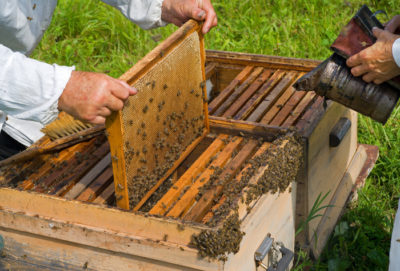I still remember the first time I got stung by a bee. I was four or five and was in the back of my mom’s car. I adjusted the way I was sitting just a little bit … and a bee stung me on the behind. I cried and cried, but never really developed the fear of bees that many people have.
And that’s a good thing, because bees are one of the best investments you can make for your self-sufficiency. Bees are facing plenty of threats from pesticides and natural factors, but without them, humans would not be able to survive. Here are just some of the reasons you should have a few bee hives on your homestead.
1. Get your own sweets
Sugar and salt are two things that are very hard to produce on your own. But, they are also necessary for a well-balanced diet. Everyone knows that bees produce honey, and the honey can act as your sugar. Plus, honey never goes bad. Jars of honey were found in the tombs of the pyramids in Egypt, and were still edible.
The Ultimate Guide to Keeping Stronger Colonies and Healthier, More Productive Bees
2. Pollinate your garden
Some of the plants you probably grow are wind pollinated, but there are tons of plants that rely on bees to pollinate them. So bees are completely indispensible if you plan on having fertile seeds to save. Their services are also required for most fruit trees, especially apples. Since they need to be around to do all this work, why not give them a safe place to stay, and get the honey too.
3. Boost your health
Bees are known to have all sorts of medical benefits associated with them. Honey can help heal a sore throat and may aid healing of a burn. But there are more serious beneficial properties as well. Honey can speed up recovery from leg and foot ulcers, and can treat certain types of gangrene. You can even get prescription honey-infused gauze or granulated honey to treat open wounds.
4. Use the wax
Honey isn’t the only usable product that bees will provide. I’ve been told to mind my own beeswax more than once, and it’s actually good advice. Beeswax can be used for hundreds of purposes, from making lip balm to candles. Beeswax candles burn cleaner and last longer than commercial candles, and there is no need to add artificial colors or scents. It is a good base for hand creams and balms, and it adds its own pleasantly mild honey aroma to anything you make with it. You can use the wax to provide an additional seal on food you’d like to preserve for a long time — such as honey.
5. Eat the pollen
Pollen that is in the hive but hasn’t yet been turned into honey can essentially be miraculous. Adding the pollen to your food may provide relief from seasonal allergies, and is considered a super food by some people. It is about 40 percent protein, and contains almost every single nutrient humans need. But be sure to thank your bees for the pollen, because a spoonful of pollen is literally billions and billions of individual pollen cells.
6. Make money
Honey, pollen, mead, wax and the associated value-added products can be a huge money-maker for you. If you have enough bees and put them in an area where they have more than enough pollen to collect, you will never run short for your own stash of honey and pollen. And in fact, you will most likely have some to get rid of in the form of gifts or sales.
Bees are magnificent creatures that do far more us than we do for them. By adding a hive to your arsenal, your personal self sufficiency will increase dramatically, and they will provide you with more benefits than almost any other single thing you can add to you homestead. And if you do have any neighbors, they can thank you for helping out their garden as well. So they’re not only invaluable for your personal needs, but can be of benefit to everyone.
What are other benefits of raising bees? Share your tips in the section below:
Every Year Gardeners Make This Avoidable Mistake — But You Don’t Have To. Read More Here.
